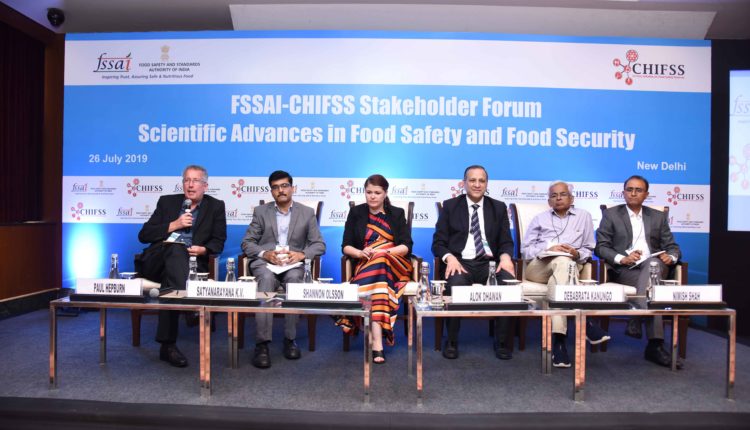CHIFSS in partnership with FSSAI organised its 6th Stakeholder Forum on “Scientific Advances in Food Safety and Food Security”
The FSSAI-Industry collaborations, to strengthen science-based foodsafety capability in India are progressing rapidly. Given the triple challenges of foodsafety, foodsecurity and nutritional security facedby the country, there is an urgent need to drive improvements in efficiency and effectivenessof overall foodsystem.
As an endeavour to promote latest advances in food safety and food security, CII-HUL Initiative
on Food Safety Sciences(CHIFSS) in partnership with FSSAI organised its 6th Stakeholder Forum
on “Scientific Advances in Food Safety and Food Security”
The context of the forum was set by Dr Alok Dhawan, Director, CSIR – Indian Institute of Toxicology Research, Lucknow. He outlined advanced scientific capabilities being built in the country to help food safety and food security for the nation. During his talk, he also highlighted the critical importance of timely adoption next generation science based, risk based, objective safety evaluation approaches, application of sensors and diagnostic techniques into regulatory frameworks, so that we can keep pace with developed world, whilst ensuring a great future for our farmers and food industry and health of our vast population, and emphasized the need to focus at the origin of food supply chain viz., agriculture production end, which will help deliver safe foods to the consumers
Highlighting the critical importance of Next Generation Risk Assessment (NGRA) and its regulatory adoption, Dr Paul Hepburn, SEAC Programme Director, Food Safety and Environmental Assurance Centre, Unilever, UK, showcased risk assessment tools and shared compelling case studies illustrating practical application of these principles to food safety decision making
Dr Shannon Olsson, Head – Naturalist Inspired Chemical Ecology(NICE) at National Centre for Biological Sciences (NCBS), Bangalore. Against the backdrop of India’s current and emerging agricultural and food security challenges, NICE is a promising new area of ecological science that depends on natural means of improving agricultural productivity, protect crops, and prevent foodwastage. Dr. Olsson presented interesting case studies where principles like ‘push’ and ‘pull’ were employed to ensure crop protection.
Ms. Rita Teaotia, Chairperson , Food Safety and Standards Authority of India spoke of the scale of challenges faced by India where 1.3 billion population is vulnerable to both under nutrition and overnutrition whilst facingseveral foodsafety concerns. Among others, Ms Teaotia emphasized the need for partnerships and collaborations with all stakeholders to successfully address the complexities and challenges. She highlighted that food security and food safety and therefore a forum where both the subjects are deliberated through the lens of science was very much the need of the hour.
Dr A Sivakumar, Regulatory Affairs Director, Hindustan Unilever Limited welcomedthe audience to the event. He highlighted the need to institutionalize food safety and build capacity and capability. He highlighted the work done by CHIFSS so far in the area of mitigation of food borne illness, microbiological food safety and need forrisk-based approaches by coordinating with international and national experts to bring in best global practices.
Dr Indrani Ghose, Strategic Advisor, CII- FACE concludedby statingthat CHIFSS, in partnership with FSSAI, is becoming one of the pioneering examples of scientific capability building platform. CHIFSS will continue to focus on building advanced scientific capabilities and enabling acceleration of technical capacity building in the country with the aim of achieving food safety excellence at par with the global standards.
As part of the deliberations, a panel discussion on “Scientific Advances in Food Safety and Food Security – How to integrate this into practice” was conducted with domain experts who talked during their respective sessions along with Dr Debabrata Kanungo, Chairman (FSSAI panel for Pesticides and Antibiotic Residue), Dr Satyanarayana K.V (Associate Vice President – Life Science Advisory Group, Sathguru Management Consultants), Dr Nimish Shah (Director, Partnership and Advocacy, Hindustan Unilever), emphasized the criticality of leapfrogging country capability build in these newerareas off foodsafety and foodsecurity sciences, discussed some of the key challenges and way forward in adoption of new concepts and methods (like NGRA, NICE approaches). Like wide ranging issues e.g. Anti Microbial Resistance, Microbiome, and pesticide residues in food. Dr Kanungo shared his view that as a country we should be proactive in adopting newer risk assessment approaches as only these will help in ensuring safe food for our vast population. Also the need to include farm level safety in regulation was discussed. The day concluded with some thoughts on taking the recommendations ahead from each of the talks and panel discussion by scoping relevant pilot projects.
The Stakeholder Forum was attended by stakeholders including eminent scientists, government officialsand professionals fromacademia and Industry along withstudents from related fields.
First Published in: FNB News
Live Mint
Nuffoods Spectrum
ET Retail
India TV
Yahoo News
DNA India


